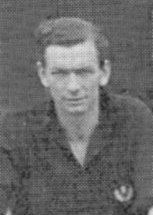
18. William Neil White was a student at Cambridge University in 1939 when war broke out. He won a Military Cross while serving in Italy. On leaving the army he joined Western in 1947 and won the first of his 10 caps that year. He clearly had made a reputation for himself as an outstanding winger, and was selected without going through the conventional trial system of the time, because the horrendous winter that year ruined the planned schedule. He scored four goals in a 6-1 demolition of Wales on debut. In 1948 he resumed his studies at Cambridge. He turned down the opportunity to appear in the hockey final trial that year in order to win a Cambridge Blue for rugby, but was still selected for the Scottish hockey XI. Later in 1948 he was selected for the GB Olympic squad, one of five Scots, and won a silver medal. He evidently returned to Glasgow and added a further six caps between 1949-51 as a Western member, before moving to the Borders to a teaching post. So, to sum up: Military Cross, double Cambridge Blue, Scottish internationalist and Olympic Silver Medallist – Western’s most notable player? And, I bet he always stood his round …..